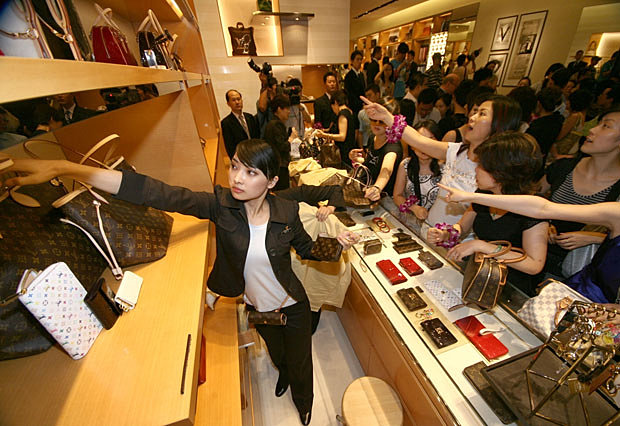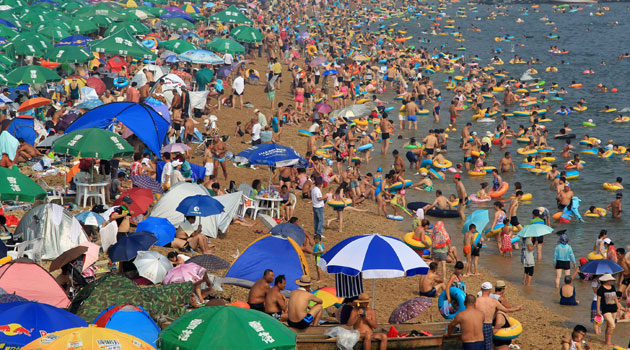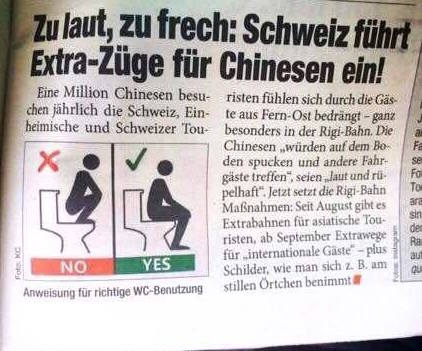China Is Starting to Get Embarrassed About Its Tourists' Obnoxious Behavior Abroad
A teenager's defacement of an ancient Egyptian temple has been cause for soul-
Chinese characters that read "Ding Jinhao
 paid a visit here" are seen carved on a statue on the wall of an ancient temple in Luxor on May 6, 2013. (Reuters)
paid a visit here" are seen carved on a statue on the wall of an ancient temple in Luxor on May 6, 2013. (Reuters)Chinese tourists are making their mark on the global tourism industry -- literally. The picture above is a relief etched 3,500 years ago in Egypt's Luxor Temple in Egypt. More recently, someone added the characters "Ding Jinhao was here," as documented by an ashamed Chinese traveler who posted his photo to Sina Weibo(registration required). "We want to wipe off the marking with a towel," the traveler wrote. "But we can't use water since it is a 3,500 year-old relic."
Ding, who turned out to be a 15-year-old from Nanjing, was quickly found out via Sina Weibo research. His parents have since apologized.
A tour guide surnamed Zhang told QQ (link in Chinese) that he "had never seen this sort of behavior from tourists," and that "until recently, the Chinese tourists going to Egypt were relatively few, and their character was relatively good."
This is all the more alarming given the rapid rise of Chinese tourism overseas, boosted by new wealth and ever-improving exchange rates. Some 83 million traveled abroad in 2012, up from just 10 million in 2000. Reports of Chinese tourists behaving badly generally include spitting, littering, ignoring traffic laws and speaking loudly. Children are another issue: reports abound of tourists letting their children defecate in public pools (paywall) and urinate in the middle of restaurants.
Uncouth visitors have caused particular strife in Hong Kong, where 70% of the 48 million tourists a year come from the Chinese mainland. But grievances are reported everywhere. Chinese travelers are ignoring dressing customs in Thai Buddhist temples , overrunning the campus of South Korea's Ewha Women's University, launching drunken singsongs in Bali and generally being loud in Singapore.
The problem has become big enough that vice premier Wang Yang recently scolded his compatriots' holiday habits. "They speak loudly in public, carve characters on tourist attractions, cross the road when the traffic lights are still red, spit anywhere and [carry out] some other uncivilized behavior," said Wang. "It damages the image of the Chinese people and has a very bad impact."
In fact, China announced just last month that it is issuing a Tourism Law to take effect in October. That law will give travel agencies the authority to penalize tourists who " violate social ethics," though it's also geared toward cleaning up the domestic tourism industry.
In a recent blog on Tea Leaf Nation, Liang Pan, a Chinese national studying in New York, pleaded for "more understanding" for the flocks of Chinese traveling overseas for the first time, chalking much of the bad behavior up to naivety and cultural misunderstanding.
He has a point. After all, vandalism of landmarks was occurring long before the Chinese tourism boom got underway. And in many places the first nationality the world associates with "loud" and "rude" tourists is still the US. Maybe it's just one of those things that comes with being a superpower.
After seeing a record number of Chinese tourists over the Lunar New Year holiday, some locals described what they experienced as “cultural clashes”, others simply found the visitors' behaviour disturbing and rude.
In a Letter to Editor published in Thailand’s English daily The Nation, Lamphun resident Vint Chavala wrote:
[Chinese tourists] tend to drive speedily on the wrong side of the road, and often go against traffic on one-way streets. Chinese tourists also often stop in the middle of busy intersections - just to argue among themselves about directions.Some hotel and guesthouse operators are turning them away because they say Chinese tourists often rent a room for two, but stay overnight in a group of four or five. They also deplore their tendencies to litter and hang their clothing on the balcony railing.
Chavala then went on to urge the Thai government to work with the Chinese consulate to better educate its tourists so Thailand will “thrive” instead of “suffer” from Chinese tourism.
On social network sites and local forums, locals posted more evidence of what they say are offensive acts by the Chinese:
- Not flushing the toilet.
- Flouting traffic laws when driving, riding a bicycle, or parking their car.
- Being loud - even in five-star hotels.
- Littering, spitting, queue-jumping.
- Allowing children to defecate in public pools.
- Terrible English-language skills that lead to difficulties in communication.
Even Chinese people living in Chiang Mai said they found the behaviour of their fellow countrymen shocking and embarrassing.
“In the past I’ve always told people with pride that I am Chinese. I will be reluctant to do that in the future,” wrote one local.
"Please stop bringing shame to our people," wrote another.
Still, more Chinese tourists are bound to visit. The Tourism Authority of Thailand expected more than 1.5 million Chinese to visit by 2014.
Why the increase in visitors? When Chavala asked a Chinese tourist why he came to Chiang Mai, the man in his 30s "stabbed a thumb to his chest and said 'I am rich'."




No comments:
Post a Comment
Comments always welcome!